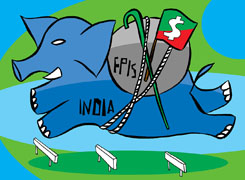Should I Stay Invested in My Rs. 200,000 Nifty IT Index Fund?
Ramalingam Kalirajan |10908 Answers |Ask -Follow
Mutual Funds, Financial Planning Expert - Answered on Jul 25, 2024
He has an MBA in finance from the University of Madras and is a certified financial planner.
He is the director and chief financial planner at Holistic Investment, a Chennai-based firm that offers financial planning and wealth management advice.... more

Sir, I have invested Rs. 200000/-in Nippon India Nifty I T Index fund in the month of Feb, 2024. Is it worth stay invested or switch over?
Understanding Index Funds
1. Passive Investment:
Index funds replicate market indices.
They offer average market returns.
2. Low Management:
Lower expense ratios due to passive management.
Limited scope for beating the market.
3. Market Volatility:
Performance tied to the market index.
Susceptible to market downturns.
IT Sector Performance
1. Growth Potential:
IT sector shows strong growth.
High potential for long-term gains.
2. Volatility:
IT stocks can be volatile.
Sector-specific risks can impact returns.
Advantages of Actively Managed Funds
1. Higher Returns:
Actively managed funds aim to outperform indices.
Fund managers adjust based on market conditions.
2. Professional Management:
Expert fund managers make strategic decisions.
Better adaptability to market changes.
3. Diversification:
Actively managed funds can diversify across sectors.
Reduce risk by spreading investments.
Disadvantages of Index Funds
1. No Market Outperformance:
Index funds cannot beat the market.
Returns are limited to index performance.
2. Lack of Flexibility:
Fixed to the index composition.
Cannot adjust to market opportunities.
3. Sector Concentration:
Heavy exposure to one sector increases risk.
IT sector concentration may not be ideal for all investors.
Evaluation of Your Investment
1. Investment Horizon:
Your investment horizon is crucial.
Longer horizons can mitigate short-term volatility.
2. Risk Tolerance:
Assess your risk tolerance.
Higher risk tolerance suits IT sector investments.
3. Diversification Needs:
Diversify your portfolio to reduce risk.
Consider adding actively managed funds.
Recommendations
1. Stay or Switch:
If you have high risk tolerance and long horizon, stay invested.
For diversification and potential higher returns, switch to actively managed funds.
2. Regular Review:
Monitor your investment regularly.
Adjust based on market performance and personal goals.
3. Seek Professional Advice:
Consult a Certified Financial Planner (CFP).
Get personalized recommendations.
Final Insights
Your investment in Nippon India Nifty IT Index Fund has potential but consider diversifying. Actively managed funds can offer higher returns and better risk management. Regularly review and seek professional advice for optimal results.
Best Regards,
K. Ramalingam, MBA, CFP
Chief Financial Planner,
www.holisticinvestment.in
You may like to see similar questions and answers below
Ulhas Joshi |280 Answers |Ask -Follow
Mutual Fund Expert - Answered on Jul 18, 2023
Ramalingam Kalirajan |10908 Answers |Ask -Follow
Mutual Funds, Financial Planning Expert - Answered on May 17, 2024
Ramalingam Kalirajan |10908 Answers |Ask -Follow
Mutual Funds, Financial Planning Expert - Answered on May 21, 2024
Ramalingam Kalirajan |10908 Answers |Ask -Follow
Mutual Funds, Financial Planning Expert - Answered on Sep 22, 2024
Samraat Jadhav |2514 Answers |Ask -Follow
Stock Market Expert - Answered on Oct 18, 2024
Ramalingam Kalirajan |10908 Answers |Ask -Follow
Mutual Funds, Financial Planning Expert - Answered on Dec 20, 2025
Ramalingam Kalirajan |10908 Answers |Ask -Follow
Mutual Funds, Financial Planning Expert - Answered on Dec 20, 2025
Naveenn Kummar |237 Answers |Ask -Follow
Financial Planner, MF, Insurance Expert - Answered on Dec 20, 2025
Ramalingam Kalirajan |10908 Answers |Ask -Follow
Mutual Funds, Financial Planning Expert - Answered on Dec 19, 2025
Nayagam P P |10859 Answers |Ask -Follow
Career Counsellor - Answered on Dec 19, 2025
Ramalingam Kalirajan |10908 Answers |Ask -Follow
Mutual Funds, Financial Planning Expert - Answered on Dec 19, 2025
Ramalingam Kalirajan |10908 Answers |Ask -Follow
Mutual Funds, Financial Planning Expert - Answered on Dec 19, 2025
Ramalingam Kalirajan |10908 Answers |Ask -Follow
Mutual Funds, Financial Planning Expert - Answered on Dec 19, 2025
Radheshyam Zanwar |6751 Answers |Ask -Follow
MHT-CET, IIT-JEE, NEET-UG Expert - Answered on Dec 19, 2025
Radheshyam Zanwar |6751 Answers |Ask -Follow
MHT-CET, IIT-JEE, NEET-UG Expert - Answered on Dec 19, 2025



























